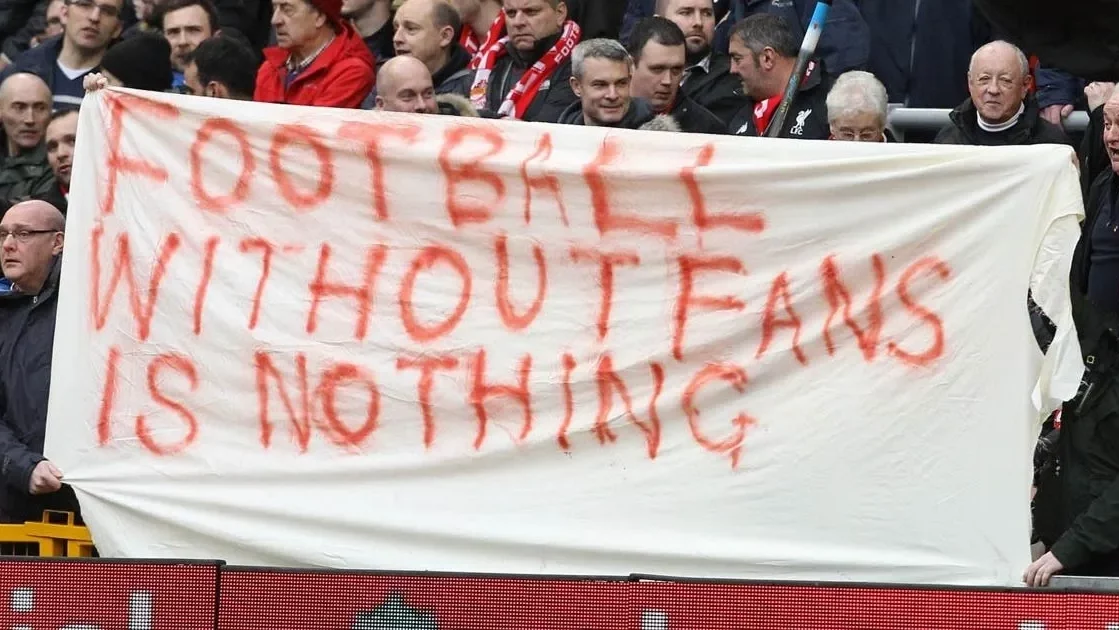The gambling industry has hijacked the beautiful game, with adverts, branding and sponsorship almost everywhere you look, but how do fans actually feel about it?
Words by Tom Fleming
A grassroots game
If you look past the glossy advertising and corporate boxes, football belongs to the fans. Without the fans watching and supporting, either at home or in the grounds, football simply wouldn’t exist, or, as Jock Stein put it: “football without fans is nothing”.
At its heart, football is the beautiful game and has been long before gambling sponsorship tarnished it. Football sponsorship came from humble beginnings. In 1974 Coventry City became the first English team to have a shirt sponsor when they wore a kit featuring the logo of the now-defunct Talbot Automobiles.
Since then, sponsorship and advertising in football have exploded, especially since the inception of the Premier League in 1992. The Premier League is the most-watched sports league in the world and is broadcast in 212 territories to a potential annual audience of 4.7 billion people, nearly 25% of whom are young people, which provides companies with huge commercial opportunities to enhance their image and advertise their products.
Shirt sponsorship is clearly big business but it’s also very effective. Alcohol and electronics companies were the big winners during the nineties – who remembers the iconic MacEwan’s Lager and Sharp kits? Most football fans will remember those shirts and the teams that played in them, without me mentioning the team by name (FYI – these legendary kits belonged to the title-winning Blackburn Rovers and Manchester United teams).
In 2003, when Fulham partnered with Betfair, they became the first English club to be officially sponsored by a betting company. Fast forward 18 years, and there are just three Premier League clubs without a betting partner or sponsor. Things don’t get any better in the Championship either, where 16 of the 24 teams wear kits that display the logo of a betting company.
Read more: Gambling and Football: A Toxic Relationship
It doesn’t stop at shirts either. Betting companies have completely fused themselves to the game, from the Sky Bet rebranding of the Football League to the renaming of Stoke City’s Britannia Stadium to the Bet365 Stadium. The league and its clubs are clearly well compensated for acting as billboards for gambling companies, but what do the fans, without whom football wouldn’t exist, actually think about it?

The fans
Behind the wall of industry-sponsored research and noise, there is a growing feeling among fans that gambling is an unwanted presence in football. A recent survey by Survation found that around a third of fans are less likely to buy a kit with a gambling sponsor on the front.
At the end of the 2019–20 season, Everton and Aston Villa ditched their gambling shirt sponsors (SportPesa and W88). Both clubs signed deals with Cazoo, a digital car sales platform, to become their main shirt sponsor, which led to a 60% rise in shirt sales for Everton and a 50% rise for Aston Villa. This example highlights how a potential ban on gambling advertising and sponsorship can have a positive financial impact on the clubs.
Many of the gambling brands that sponsor Premier League kits aren’t even attempting to engage with the UK market. These operators are known as ‘white label’ brands and are simply using the Premier League as a platform to reach wider markets, usually in countries where gambling is against the law. Premier League teams with ‘white label’ gambling sponsors include Crystal Palace (W88), Leeds United (SBOBET) Newcastle (Fun88), Southampton (Sportsbet.io) and Wolves (ManBetX).
Read more: The Athletic: Special Report on how Premier Shirt sponsors ‘facilitate illegal gambling’ (paywall)
Away from kits, two-thirds of people surveyed felt that there are too many gambling adverts on TV connected to football, whilst 58% felt there are too many teams are sponsored by betting companies. Over two-thirds (67%) of people thought that the whistle-to-whistle ban on gambling advertising had not prevented children from seeing gambling brands in football.
Considering the harm that gambling can cause, and the money that these sponsorship deals bring in, just 22% of participants thought that their club did enough to help people affected by gambling harm.

Supporters’ clubs and trusts
As fans, our voices are crucial in this debate. You might think that as an individual, you have limited influence over your club. However, nothing could be further from the truth. Remember, it’s our game!
We would encourage you to get in touch with your local supporters’ club to discuss the issue. Supporters’ clubs and trusts can be powerful voices when it comes to communicating with clubs. You can find details of all English and Scottish league football supporters’ clubs and trusts here.
Our campaign to rid gambling of harmful gambling adverts has already won the support of several supporters’ clubs:
“AISA are fully behind this campaign. We will continue to challenge Arsenal on the promotion of gambling in football. It’s a great idea and a very serious issue.”
Arsenal Independent Supporters’ Association
“We are very pleased to be associated with this advocacy project in supporting people whose lives have been badly affected by gambling. Gambling doesn’t just exist in betting shops, it is everywhere and is easy to access online. We back the campaign for an end to harmful gambling advertising and sponsorship in football.”
“The Argyle Fans’ Trust supports this new initiative to raise awareness of the detrimental effects of high-profile sponsorship in football from betting platforms. While the clubs may benefit from the income, it is the supporters who pay the price of gambling addiction. It is time that betting sponsorship was treated in the same way that tobacco sponsorship was – with a ban.”
“As a supporters’ trust we are very keen to support Gambling with Lives and The Big Step. Football is a sport for everyone, and gambling adverts connected to the game can influence all ages. We want football to be a safe and happy environment and we want to help stop football supporting and advocating gambling through adverts, to keep the beautiful game a good place for everyone. We know young players that have had their lives impacted through gambling and we are all looking forward to getting involved with the Big Step and helping to make a difference.“
“Walsall Supporters’ Alliance believe that the reasons behind The Big Step event are ones that people across the UK can and should get behind. Betting is prevalent at the moment, even more so online because of lockdown, and it is in peoples’ faces several times on a daily basis. This can lead to addiction, and whether you have had an addiction to gambling yourself or you know someone who suffers from this addiction, this cause is well worth getting behind.”


